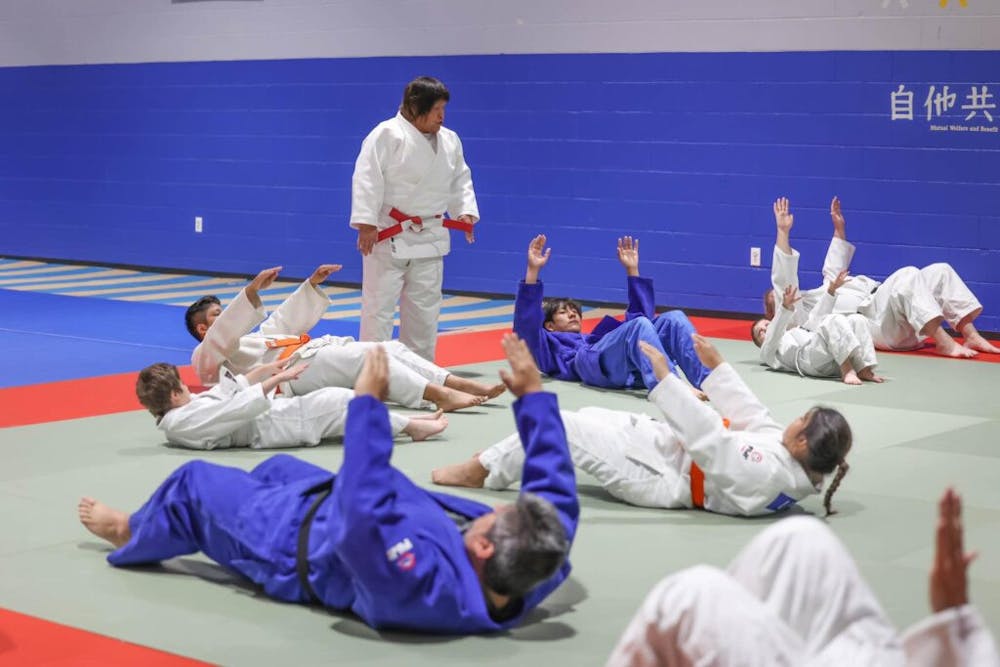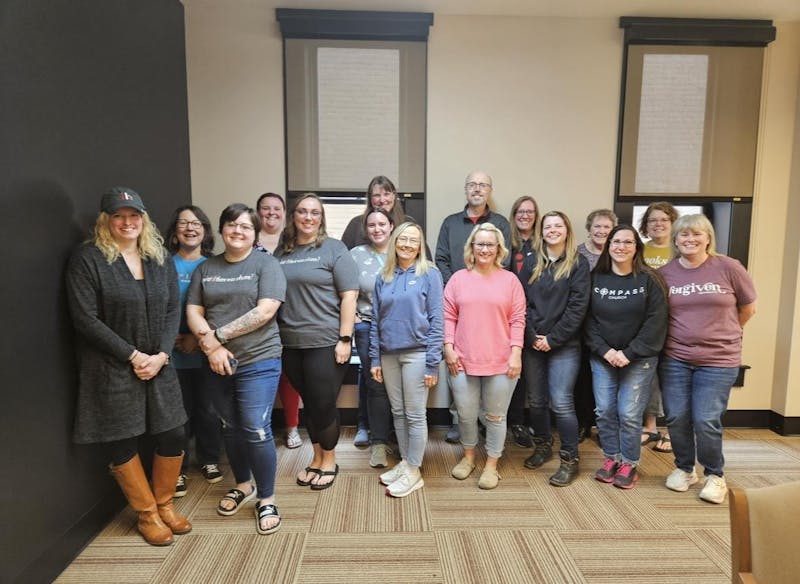When students bow their heads and step onto mats for judo training at Muncie’s Ross Community Center, they learn far more than martial arts. Students gain discipline, self-confidence and strength along with social connection and problem-solving skills.
Carey Mountcastle, who has taught the weekly class since 2016, said judo instills “maximum efficiency with mutual benefit and welfare,” which means students work toward their full potential to contribute to the betterment of the world. The unarmed Japanese martial art is also centering and stress relieving, he added.
“You come in from the hustle and bustle of working and raising a family, and all of a sudden you’re on the judo mat and the only thing you focus on for two hours is judo,” said Mountcastle, who is a financial adviser at Northwestern Mutual.
“I’ve seen students become more comfortable with themselves and learn that hard work does pay off with better mobility, focus and empathy,” said Mountcastle, who has taught the sport since 2011.
Greatness on and off the mat
Mountcastle and other volunteer instructors push the class’s school-aged judoka to achieve good grades and put maximum effort into their pursuits. Discipline in all areas of life is necessary, Mountcastle said, because judo is about “perfecting yourself to be the best you can be.”
Long-time judo student, Madison Norris, said judo has enhanced her academic and personal growth. The 16-year-old Muncie native started training at the Judo Academy in 2015 as a fun physical activity for “someone who is not huge into sports.”
Judo has become one of her favorite activities to remain physically fit and mentally focused. Norris said the instructions have taught her to focus and develop a solid work ethic.
“Other kids who do judo, myself included, are always the kids who have A's because we put in the work and take the extra time to do stuff that other kids are like ‘bare minimum was enough for me,’” said Norris, who attends Muncie Central High School.
She said the academy’s teaching style accommodates all people, regardless of age or ability. It’s nice, she added, to connect with people of all ages at the class, which is open to anyone ages five and up.
“They have the same standards for everybody no matter what it is, and they teach everybody the same thing,” Norris said.
Safety is key, fighting a last resort
Educator and athlete, Kanō Jigorō, invented judo in 1882 to live in harmony and strive for excellence. Judo emphasizes quick movements that create leverage to throw an opponent. Mountcastle said he has seen the sport elevate the lives and outlooks of many practitioners, who are called “judoka.” Judoka turn an opponent's force to their advantage rather than to oppose them directly. Because of this, Mountcastle said, learning to safely fall is among the students’ first lessons.
“You're going to allow yourself to be thrown because other people need to learn the techniques, just like they're going to allow you to throw them,” said Mountcastle, a third-degree black belt. “You need to know how to fall to protect yourself.”
Getting knocked down happens on and off the mat. Mountcastle and the other four instructors use judo to prepare students for the challenges of life.
“Life is hard, judo is hard and you’re going to get knocked down in life and you’re going to get knocked down in judo,” Mountcastle said. “The important thing is to get back up.”
Mountcastle said judo’s lessons of respect and benevolence also apply to life off the mat. And although judo is a method of self-defense, the academy reinforces that fighting is a last resort.
“Every day, there’s something about judo that’s in the back of my mind,” Mountcastle said. “It’s making sure that I do things the way that a judoka should do them, which is being polite, being respectful, helping others, listening, trying my best and allowing myself to get back up when life knocks me down.”
Personalized attention, individual goals
Ross Community Center judo instructors take time to meet with beginners to determine why they enrolled, their goals, and how much they enjoy the class. Whether students continue to train or not, Mountcastle said he appreciates when people try judo.
The Ross Community Center Judo Academy welcomes anyone interested in trying the art of judo and is open to anyone age 5 and up at any point in the calendar year. Classes combine both children and adults for a monthly cost of $20 per student with $5 for each additional student in a family.
Ross Community Center Executive Director Jacqueline Hanoman said the center’s costs for programs are negotiable and scholarships are available. “Money should never be a barrier to participate,” she added.
A judo gi — or uniform — is required for class, but students may borrow one from the academy or buy one through an established discount supplier.
Hanoman said students do not need to live in the neighborhood (Thomas Park/Avondale) to attend the center’s classes. Anyone is welcome from anywhere, she added.
Part of a broader effort
The academy began in 2014, when the center’s board invited Sensei John Hampton to establish it at the center. A six-degree black belt, Hampton started practicing judo when he was nine and has been teaching the sport since 1984.
Hanoman said that like the center’s other sports programs, the judo academy empowers participants to be more confident and collaborative.
“Our work with kids and adults in sports is not so much about competitiveness,” Hanoman said. “One of the beauties of judo, for example, is discipline.”
Hanoman said the center aspires to build community and advance education and lifelong learning as well as health and wellness within a diverse community. While the center is focused on serving Muncie’s south side, anyone is invited to participate in the center’s programs.
Learn more about the Ross Community Center and sign up for programs at rosscenter.org. The judo academy meets from 5-7 p.m. every Monday and Wednesday at the center, at 1110 W 10th Str.
Inform Muncie articles are written by students in the School of Journalism and Strategic Communication in a classroom environment with a faculty adviser.





The Daily News welcomes thoughtful discussion on all of our stories, but please keep comments civil and on-topic. Read our full guidelines here.